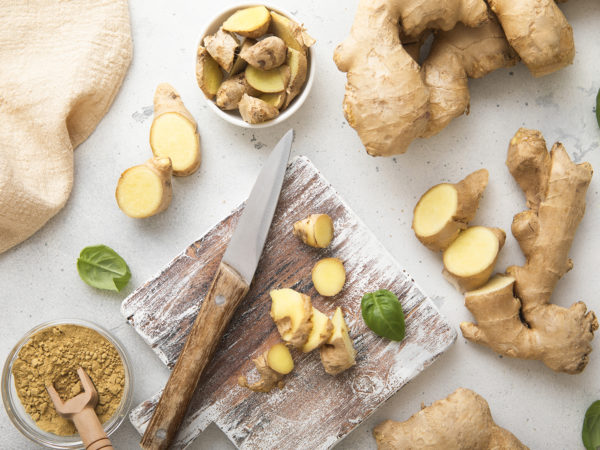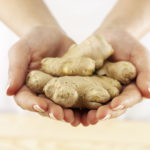Ginger and Irritable Bowel Syndrome/Inflammatory Bowel Disease
I know ginger can be helpful for indigestion or other gastrointestinal distress, but is it effective in more serious conditions, like IBS or IBD?
Andrew Weil, M.D. | September 11, 2025

Ginger has long been used to address nausea, and many of us have sipped ginger ale to calm an upset stomach. For those prone to motion sickness, it can be especially helpful to have a few ginger candies on hand during a road trip or boat ride. Clinical trials have shown ginger to be effective in relieving nausea and vomiting during pregnancy and after surgery, and it also has anti-inflammatory properties. The evidence has been mixed on whether ginger is a reliable therapy for irritable bowel syndrome (IBS), inflammatory bowel disease (IBD), or other functional bowel disorders, but some individuals report finding it beneficial.
Ginger has been used for thousands of years for digestive symptoms, but it has not been clear exactly how it works. A 2025 study provided new insight into the mechanism by which ginger acts on the colon, which may pave the way for new research on how to use that process to help those with IBD.
In the study, researchers looked at a component of ginger called furanodienone (FDN) and traced its specific action in the intestines. After determining the complex process by which FDN functions, researchers found that providing the compound to mice with colitis not only relieved inflammation throughout the body but also acted specifically to ease the symptoms of bowel disease. There’s a long way to go from mice to humans, but I’m encouraged by this finding, which opens the door to further study and potential treatment for IBD and other bowel conditions.
One of the reasons this approach is so important is that so many of the usual treatments for IBD rely on immunosuppression. Tamping down the immune response is effective in some (not all) IBD patients, but I’m concerned about any intervention that relies on subverting the body’s natural defense mechanisms. Those treatments may increase risk of infections and other complications, so discovering a new way to alleviate inflammation without suppressing the immune system would be very exciting.
Many of those who experience the symptoms of IBS or IBD already use ginger for relief. It may not help everyone, but it’s worth a try. See my guide to ginger for best uses and doses, along with some cautions.
Andrew Weil, M.D.
Sources
Wang X, Zhang G, Bian Z, Chow V, Grimaldi M, Carivenc C, Sirounian S, Li H, Sladekova L, Motta S, Luperi Y, Gong Y, Costello C, Li L, Jachimowicz M, Guo M, Hu S, Wilson D, Balaguer P, Bourguet W, Mani S, Bonati L, Peng H, March J, Wang H, Wang S, Krause HM, Liu J. “An abundant ginger compound furanodienone alleviates gut inflammation via the xenobiotic nuclear receptor PXR in mice.” Nat Commun. 2025 Feb 3;16(1):1280. doi: 10.1038/s41467-025-56624-0. Erratum in: Nat Commun. 2025 Mar 3;16(1):2133. doi: 10.1038/s41467-025-57509-y. PMID: 39900639; PMCID: PMC11791082. https://pubmed.ncbi.nlm.nih/39900639/
van Tilburg MA, Palsson OS, Levy RL, Feld AD, Turner MJ, Drossman DA, Whitehead WE. “Complementary and alternative medicine use and cost in functional bowel disorders: a six month prospective study in a large HMO.” BMC Complement Altern Med. 2008 Jul 24;8:46. doi: 10.1186/1472-6882-8-46. PMID: 18652682; PMCID: PMC2499988. https://pubmed.ncbi.nlm.nih/18652682/
Villablanca EJ, Selin K, Hedin CRH. “Mechanisms of mucosal healing: treating inflammatory bowel disease without immunosuppression?” Nat Rev Gastroenterol Hepatol. 2022 Aug;19(8):493-507. doi: 10.1038/s41575-022-00604-y. Epub 2022 Apr 19. PMID: 35440774. https://pubmed.ncbi.nlm.nih/35440774/












